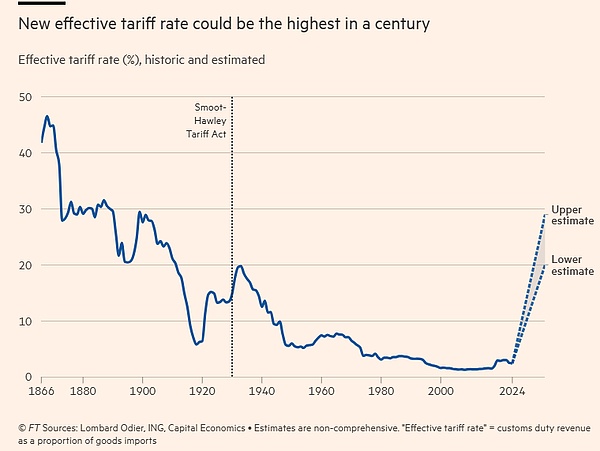
Text: The Financial Times
Donald Trump launched a new round of attacks on the global trade order on Wednesday, announcing a series of new tariffs on all commodities exported to the United States, a move that caused Wall Street stock index futures to plummet.
The president said that from April 5, almost all goods imported from the United States will be subject to 10% tariffs, and he also announced additional so-called reciprocal tariffs, which means that the total tariffs on the EU will be as high as 20%, and the total tariffs on Japan will be as high as 24%, and will take effect on April 9. Trump has imposed a 20% tariff earlier this year, and an additional 34% tariff means the U.S. tariffs on the world's largest exporter of goods will rise to 54%. This number could rise sharply if the U.S. implements a plan to tax Venezuelan oil buyers.
Trump's statement caused U.S. stock index futures to fall, with contracts tracking the S&P 500 falling 3.3% in Asian trading on Thursday, and contracts tracking the Nasdaq 100, which is dominated by technology stocks, down 4.2%.
Previously, the blue-chip S&P 500 index fell nearly 5% in the first three months of this year due to concerns that Trump's tariffs will slow economic growth and trigger a new round of high inflation.
Trump declared that the imposition of new taxes on goods entering the United States was a way to “liberate” the U.S. economy, raise funds for the federal government to make up for tax cuts and stimulate the recovery of manufacturing.
"Faced with the ruthless economic war, the United States can no longer pursue unilateral economic surrender." Trump told audiences outside the White House.
"We must take good care of our people, and we will give priority to our people." But investors and analysts say these tariffs will disrupt supply chains and bring shock waves to U.S. businesses. They also warn that these tariffs could significantly push up U.S. consumer prices and lead to slowing growth. "This is close to the worst that the market is concerned about. It will cause damage," said Ajay Rajadhyaksha, president of Barclays Global Research.p>
U.S. corporate giants including Apple, Walmart, Amazon and Nvidia suffered heavy blows in Wall Street after-hours trading. FactSet data shows that more than 90% of the blue-chip S&P 500 stocks fell in after-hours trading.
Gold rose 0.7%, setting an all-time high of $3,150 per ounce. Gold prices have risen sharply this year as investors seek safe-haven.
Trading volumes in early Asian trading hours are usually lower, which may exacerbate the magnitude of stock price volatility.
The measures Trump announced on his so-called "liberation day" will intensify escalating trade frictions since he won the November election with his economic protectionist populist agenda. Analysts say that U.S. trading partners have little choice but to retaliate against Trump's measures, which increases the possibility of a global trade dispute that undermines the economy. "'Revenge Day' will follow' Liberation Day'." "If countries don't fight back, they will appear weak," he added, but expects they will "open the door" for negotiations. He said full tariffs increase the likelihood of a U.S. recession.
According to the White House, some commodities will be exempted from reciprocal tariffs, including energy and minerals that the United States does not have, gold and silver, and some commodities that Trump has imposed other tariffs.
It includes steel, aluminum and cars, as well as imported products that Trump has said it will impose separate tariffs, including copper, medicines, computer chips and wood.
Mexico and Canada—trading partners Trump has repeatedly attacked in recent weeks—will also be exempt from universal tariffs. Goods that meet the 2020 trade agreement signed by the two countries and the United States will continue to be exempted from tariffs.
Gabriela, head of financial and economic research at Banco Base"This is bad news for the world, especially those who are subject to tariffs, but good news for Mexico. Despite Trump's continuous protectionist rhetoric, Mexico may eventually win market share."












